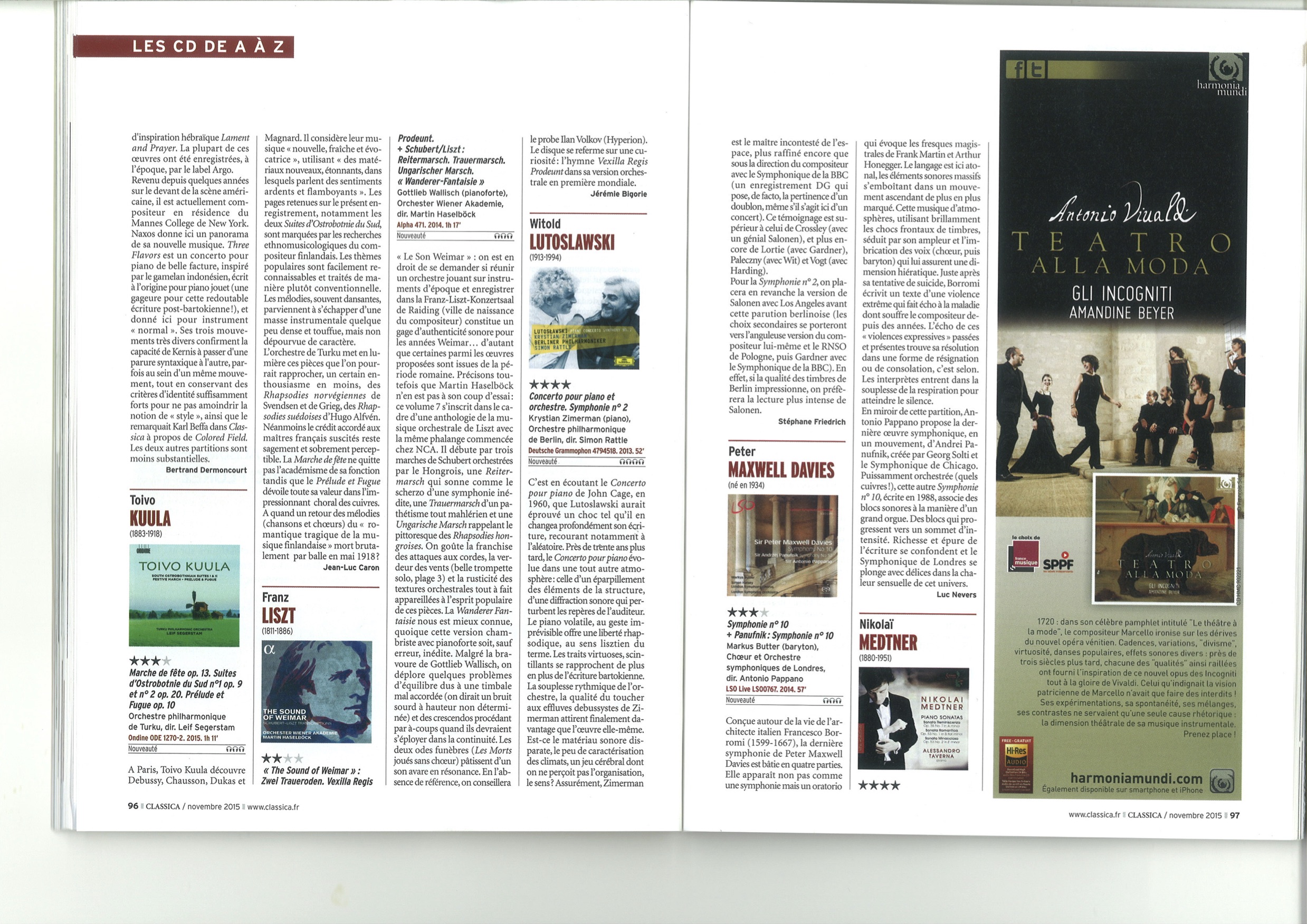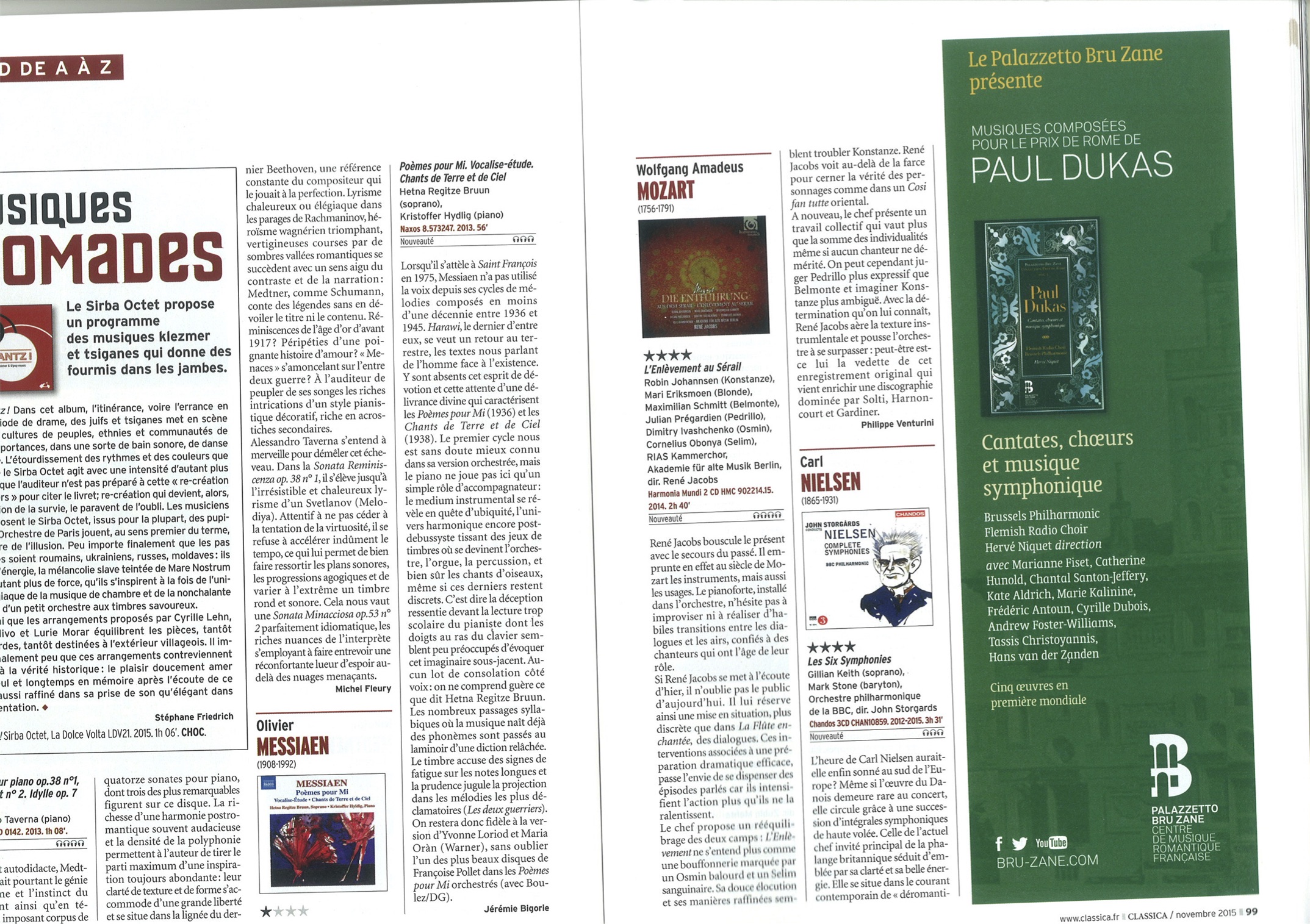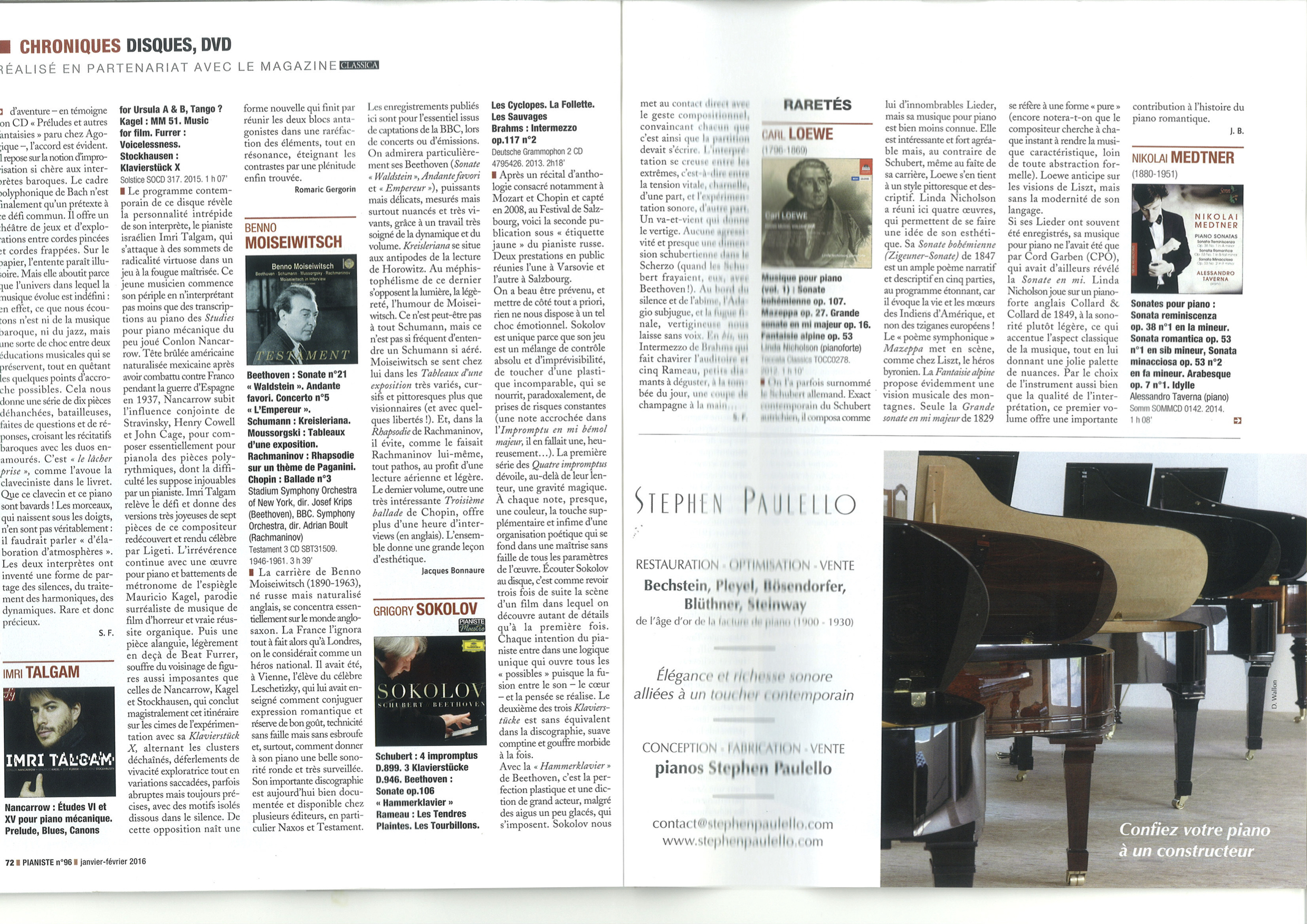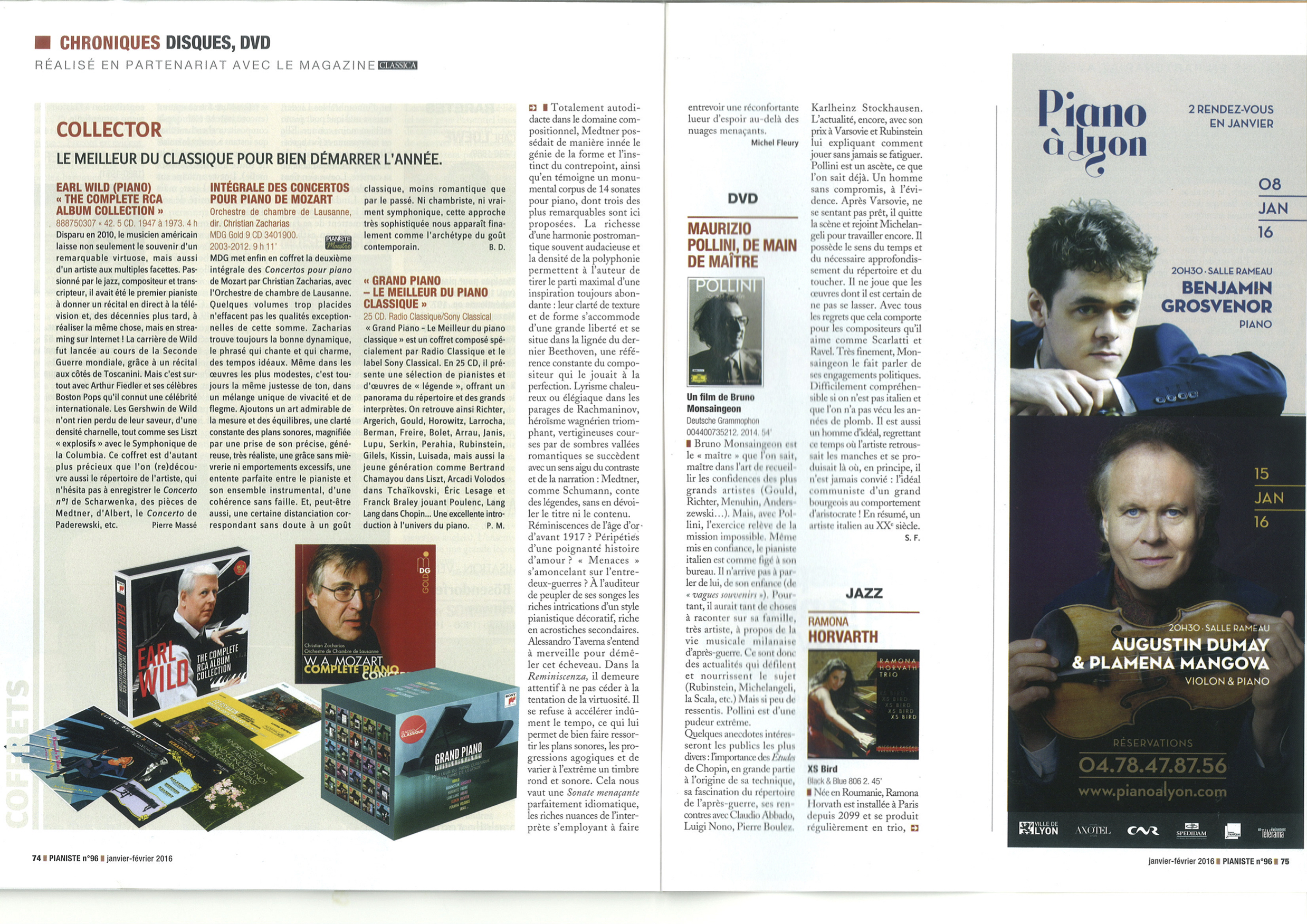Medtner Album Review by Michel Fleury: Classica Magazine and Pianiste Magazine (France)
Totalement autodidacte dans le domaine compositionell, Medtner possédait de manière innée le génie de la forme et l’instinct du contrepoint, ainsi qu’en témoigne un imposant corpus de quatorze sonates pour piano, dont trois des plus remarquables figurent sur ce disque. La richesse d’une harmonie postromantique souvent audacieuse et la densité de la polyphonie permettent à l’auteur de tirer le parti maximum d’une inspiration toujours abondante: leur clarté de texture et de forme s’accommode d’une grande liberté et se situe dans la lignée du dernier Beethoven, une référence constante du compositeur qui le jouait à la perfection. Lyrisme chaleureux ou élégiaque dans les parages de Rachmaninov, héroïsme wagnérien triomphant, vertigineuses courses par de sombres vallées romantiques se succèdent avec un sens aigu du contraste et de la narration: Medtner, comme Schumann, conte des légendes sans en dévolier le titre ni le contenu. Réminiscences de l’age d’ir d’avant 1917? Pèripèties d’une poignante histoire d’amour? «Menaces» s’amoncelant sur l’entre deux guerre? À l’auditeur de peupler de ses songes les riches intrications d’un style pianistique décoratif, riche en acrostiches secondaires.
Alessandro Taverna s’entend à merveille pour démêler cet ècheveau. Dans la Sonata Reminiscenza op. 38 n° 1, il s’élève jusqu’à l’irrésistible et chaleureux lyrisme d’un Svetlanov (Melodiya). Attentif à ne pas céder à la tentation de la virtuosité, il se refuse à accélérer indûment le tempo, ce qui lui permet de bien faire ressortir les plans sonores, les progressions agogiques et de varier à l’extrême un timbre rond et sonore. Cela nous vaut une Sonata Minacciosa op. 53 n° 2 parfaitement idiomatique, les riches nuances de l’interprète r’employant à faire entrevoir une réconfortante lueur d’espoir audelà des nuages menaçnts.
Michel Fleury
***Translation***
Totally self-taught in composition, Medtner had the innate genius of the form and the instinct of counterpoint, as evidenced by an impressive corpus of fourteen piano sonatas, of which three of the most remarkable ones are included in this disc. The richness of an often bold post-Romantic harmony and polyphony density allow the composer to make full use of a still abundant inspiration: the clarity of the texture and the shape fit fit within a large discretion and it is in line with the last Beethoven, a constant reference of the composer who has brought it to perfection. Lyrical or elegiac warmth in the spirit of Rachmaninov, triumphant Wagnerian heroism, dizzying races through dark romantic valleys follow one another with a strong sense of contrast and narration: Medtner, like Schumann, tells legends without declaring title or content . Reminiscences of the age before 1917? Adventures of a poignant love story? “Threats” that are piling up between the two Wars? Rich intricacies populate the dream’s listener of a decorative piano style, rich of secondary acrostics.
Alessandro Taverna wonderfully succeeds to untangle this muddle. In Reminiscenza Sonata op. 38 No. 1, he elevates himself to the irresistible and warm lyricism of Svetlanov (Melodiya). Careful to not yield to the temptation of virtuosity, he refuses to unduly speed up the tempo, allowing him to bring out the sound plans, the agogic progressions and to vary in an extreme way and a round and resonant timbre. This This allows us to earn a perfectly idiomatic Minacciosa Sonata op. 53 No. 2, with the rich nuances of the performer working in favor of a comforting glimpse of hope beyond the menacing clouds.
Michel Fleury
-
Recent News
- Video: Britten Piano Concerto – Dallas Symphony Orchestra (YouTube) 26 January, 2024
- Video: San Carlo, magia sinfonica (RAI TGR Campania) 1 January, 2024
- Review: Il rigore e la passione di Dego e Taverna (Il portale del violino) 18 December, 2023
- Review: Taverna, Ceretta e ORT (DeArtes) 11 December, 2023
- Review: Diego Ceretta con Alessandro Taverna e l’Orchestra della Toscana (Operaclick) 5 December, 2023
- Review: Angius, Taverna e l’OPV omaggiano Malipiero (Il Giornale della Musica) 24 November, 2023
- Review: Yutaka Sado and the DSO brilliantly deliver a fresh program (Dallas Morning) 18 November, 2023
- Review: Il Verdi di Trieste infiamma il pubblico (Musica) 11 October, 2023
- Review: Trieste, Teatro Verdi: Sesto concerto della stagione sinfonica (Operaclick) 9 October, 2023
- Interview: A Portogruaro la musica è multiverso (Il Giornale della Musica) 21 August, 2023
- Review: Colori Russi (L’Ape Musicale) 28 July, 2023
- Review: Torre del Lago, Concerto diretto da Gianandrea Noseda con Alessandro Taverna (OperaClick) 24 July, 2023
Latest tweets
Recent News
- Video: Britten Piano Concerto – Dallas Symphony Orchestra (YouTube)
- Video: San Carlo, magia sinfonica (RAI TGR Campania)
- Review: Il rigore e la passione di Dego e Taverna (Il portale del violino)
- Review: Taverna, Ceretta e ORT (DeArtes)
- Review: Diego Ceretta con Alessandro Taverna e l’Orchestra della Toscana (Operaclick)




